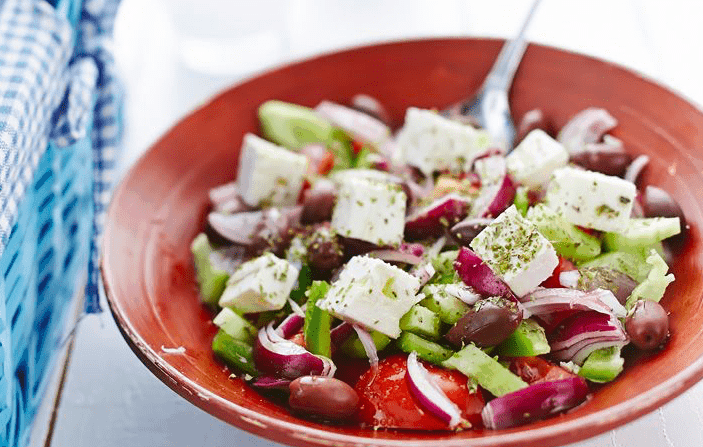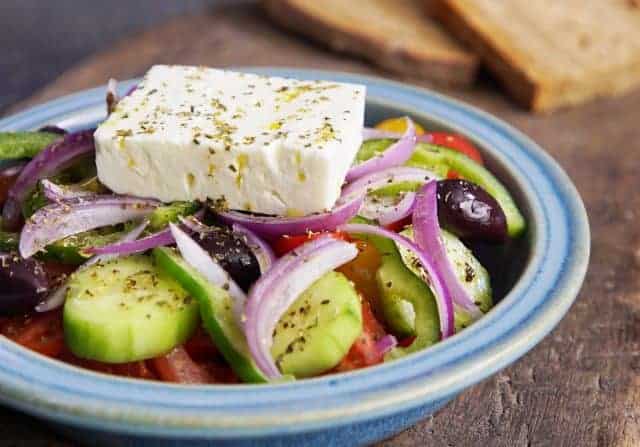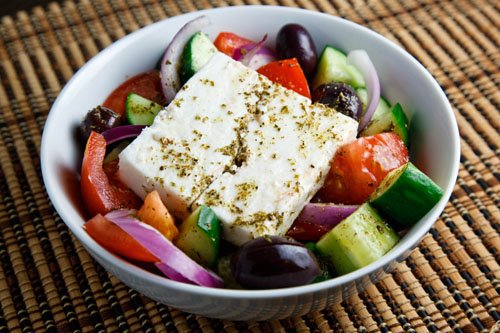
The Greek salad is not only Greece’s most popular salad, it is also one of the world’s most loved, and for a very good reason!
Traditional Greek salad, also known as Xoriatiki, is packed with vitamins and minerals that are proven to help maintain a healthy body and mind.
Although these days there are many variations, an authentic Greek salad features tomatoes, cucumbers, red onion, olives, feta, oregano and olive oil. The combination of these ingredients is a simple way to add key vitamins and minerals to your everyday diet and over summer we can guarantee you most Greeks do consume a Xoriatiki every single day!
Greek salad is low-calorie and nutrient-dense, also providing you with a healthy dose of vitamins A and C, as well as potassium and iron. It also contains phytonutrients and antioxidants, which reduces the risk of health problems such as heart disease and cancer.

And here we break down each ingredient to show just how good a Greek salad is for you!
Tomatoes are the major dietary source of the antioxidant lycopene, which has been linked to many health benefits, including reduced risk of heart disease and cancer. They are also a great source of vitamin C, potassium, folate and vitamin K.
Cucumbers are low in calories but contain many important vitamins and minerals, as well as a high water content. Eating cucumbers may lead to many potential health benefits, including weight loss, balanced hydration, digestive regularity and lower blood sugar levels.
Oregano health benefits include reducing infections, preventing damage to cells by free radicals, treatment of common cold, treating menstrual cramps, preventing cancer, relieving inflammation and killing intestinal parasites. Other benefits includes combating bacteria, supporting heart health, supporting the body with nutrients, supporting weight loss and improving digestion.
Olive oil is rich in vitamins, it has antioxidant properties, so it might help prevent or reverse damage from cancer-causing ultraviolet radiation and it moisturizes and fights bacteria. Olive oil also reduces brain inflammation and is said to help fight off Alzheimer’s disease.
Onions contain small amounts of calcium, iron, folate, magnesium, potassium and antioxidants.
Olives are very high in vitamin E and other powerful antioxidants. Studies show that they are good for the heart, and may protect against osteoporosis and cancer.
Feta is mainly made from sheep or goat milk (often combined), Feta cheese is a nutrient-rich option and a deliciously flavoured dairy. Feta’s nutritional overview includes significant protein; calcium; B-complex vitamins riboflavin, vitamin B6, B12, and pantothenic acid; vitamin A; iron; phosphorus; zinc; and many trace minerals (selenium, magnesium, potassium, copper, and manganese).
Ingredients & Method (Serves 6)
- 3 large ripe tomatoes, cut into medium pieces or wedges
- 2 cucumbers, sliced
- 1 small red onion, thinly sliced
- Salt and freshly ground black pepper to taste
- 4 tablespoons olive oil
- 1 & 1/2 teaspoons dried oregano
- 200g feta, crumbled
- Handful of Greek olives
- Combine all ingredients in bowl, toss and serve


